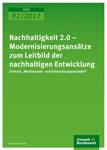Sustainability 2.0 - Modernisation approaches to the guiding principle of sustainable development
Abstract
In science, politics and society, a discourse on new models of prosperity and development has emerged in recent years. The starting point for the debate is the increasing criticism of the strong focus on economic growth (measured by gross domestic product) as the central indicator for measuring social prosperity and a good life. The criticism is that such a view ignores important aspects that contribute significantly to quality of life: social and cultural participation, health, an intact environment and solidarity. Many approaches therefore argue for a broader understanding of prosperity that includes immaterial factors in addition to economic and other material aspects. The following questions are at the centre of the debate: What constitutes prosperity or a good life and how can this be measured? To what extent are growth and prosperity related? What kind of prosperity can we realise in the long run and generalise globally without exceeding ecological and planetary limits? This study analyses the relevance of the discourse complex around new models of prosperity and development for the German government's guiding principle of sustainable development. It will be worked out what opportunities, but also risks, a stronger link to this discourse holds for the modernisation and strengthening of the guiding principle of sustainable development.
